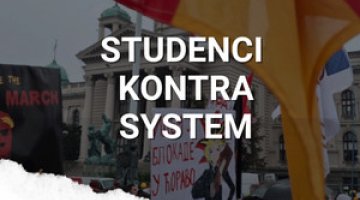US sanctions against Serbian oil company NIS
On 9 October, the United States’ sanctions on the Serbian oil company NIS, which is owned by Russian entities, came into force. The company was added to the sanctions list as part of a comprehensive package of restrictive measures targeting Russia’s energy sector, adopted by President Joe Biden’s administration on 10 January 2025 (see ‘Sanctions on Russia: the Biden administration’s parting blow’). This measure was intended to compel changes in the company’s ownership structure, in which the majority of shares were held by Gazprom Neft (50%) and Gazprom (6,15%; see ‘US sanctions targeting Russian energy assets in Serbia’). The entry into force of the sanctions cuts the company off from its sole crude oil supply route, as the Croatian company JANAF has suspended deliveries of the fuel to Serbia’s only refinery in Pančevo, which is owned by NIS. . It will also hinder the company’s financial operations owing to the risk of secondary sanctions, which could lead to its uncontrolled bankruptcy.
The US Department of the Treasury several times granted a special licence delaying the full implementation of the sanctions (most recently on 1 October), and the Serbian authorities had hoped that NIS would be removed from the sanctions list – even more so as changes had already been made to the company’s ownership structure. The entity subject to the US sanctions, Gazprom Neft, formally reduced its stake to 44.9%, while 11.3% of shares were transferred to JSC Intelligence, a company controlled by Gazprom Kapital. The remaining 29.9% of shares are owned by the Serbian state, with the rest held by smaller shareholders. In 2022, the company managed to avoid EU sanctions (following tactical ownership adjustments), but was nevertheless forced to cease processing Russian crude oil due to the EU’s embargo on maritime imports (see ‘Serbia: the forced abandonment of Russian oil’).
In the short term, the enforcement of the sanctions will cause serious disruptions in the Serbian fuel market, as NIS controls 80% of it and 50% of retail sales. Nevertheless, the authorities in Belgrade have declared that the existing reserves will suffice to meet domestic demand until the end of the year. The company’s future will depend on the position adopted by the Serbian government, which seeks to avoid an open conflict with Moscow while simultaneously facing pressure from the United States – and, to a lesser extent, the European Union.
Commentary
- The enforcement of the sanctions marks the failure of Belgrade’s efforts to persuade the Donald Trump administration to grant a long-term suspension of the measures and to remove NIS from the sanctions list (requests to this effect were submitted in March and again in September). The Serbian authorities argued to the United States that, given the company’s crucial role in the national economy (it generates between 4.5% and 6% of GDP) and the reportedly limited influence of Gazprom Neft on its operations, NIS should be exempted from the sanctions regime. These efforts were supported by Budapest and by the Croatian company JANAF, which controls the network of pipelines running to Serbia and Hungary, and derives most of its revenue from fees for transporting crude oil to Pančevo.
- Russia had assumed that, in light of improving bilateral relations, the Trump administration would show greater leniency regarding the NIS issue. The company represents a key instrument of Russian influence in the Balkans, one that Moscow is unwilling to relinquish. This influence extends not only to the energy sector (through the obstruction of oil and gas market liberalisation and the diversification of supply routes), but also to the cultivation of political ties (through individuals who derive personal benefits from cooperation with Russian entities), and to the promotion of a positive image of Russia (the NIS social projects budget amounts to approximately €4 million annually).
- Moscow will exploit Serbia’s dependence on imports of Russian gas (amounting to 2.2 bcm annually) to deter it from undertaking actions detrimental to the Kremlin’s interests. These supplies are currently provided under a short-term contract due to expire on 31 December; Belgrade is presently negotiating a new long-term agreement, as the previous one expired in May 2025.
- The sanctions imposed on NIS demonstrate the United States’ determination to reduce Russia’s revenues from oil exports and to curtail its influence in the Balkan energy market. The chargé d’affaires of the US Embassy in Belgrade stated that the restrictions are not directed against the Serbian people, but represent a form of financial pressure on Moscow aimed at compelling it to end the war in Ukraine. He also emphasised that the Serbian authorities should work towards the removal of Russian entities from NIS, which would enable Serbia to regain control over key assets in the fuel sector and ensure the country’s energy security – a goal in which the United States is prepared to offer its support.
- The current crisis is a consequence of Serbia’s policy of avoiding steps towards the diversification of gas and oil sources and import routes, a stance taken under pressure from Russia. Although Belgrade, under strong pressure from the EU, has in the past two years signed agreements for gas supplies from Azerbaijan and completed (after years of delay) the construction of the interconnector with Bulgaria, its failure to implement regulations liberalising the energy market has allowed Russian entities to maintain their dominant position.
- The Serbian authorities strongly reject the possibility of taking any action against NIS without prior approval from Moscow – such as the nationalisation of the company or the initiation of controlled bankruptcy proceedings. A potential buyout of all or part of the shares by the Serbian government or another entity has been considered, but Russia has dismissed this option. Croatia has declared its readiness to take over NIS, while media reports have suggested that US and Azerbaijani energy companies have also expressed interest in acquiring the company. Hypothetically, the Serbian authorities could temporarily assume control of a portion of the Russian-held shares to prevent a scenario in which the refinery halts operations. However, if the sanctions remain in place, the sale of assets to entities from third countries may ultimately prove necessary.
- The resolution of the NIS issue will depend on the determination of the United States and the European Union to effectively curtail Russia’s presence in the region, as well as on their support for Belgrade during negotiations with Moscow and throughout the difficult transition period of phasing out Russian fuels. During her visit to Belgrade on 15 October, European Commission President Ursula von der Leyen offered Serbia the opportunity to join the EU’s joint gas purchasing programme.





